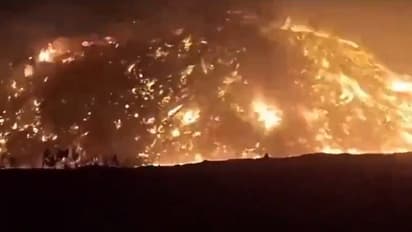100 rocket launchers, 1000 canisters: Hezbollah targets ablaze after Israeli strikes in Lebanon (WATCH)

Synopsis
In a dramatic escalation of hostilities, the Israel Defense Forces (IDF) carried out extensive air strikes on southern Lebanon, targeting Hezbollah positions.
In a dramatic escalation of hostilities, the Israel Defense Forces (IDF) carried out extensive air strikes on southern Lebanon, targeting Hezbollah positions. Israeli warplanes unleashed over 100 strikes on Thursday evening, hitting rocket launchers, weapons storage facilities, and other key military infrastructure linked to the militant group. Dramatic footage from the scene captured Hezbollah targets engulfed in flames, illustrating the intensity of the assault.
According to the IDF, more than 100 rocket launchers and approximately 1,000 barrels—presumed to be canisters of rocket fuel—were destroyed. These launchers, the IDF stated, were primed to fire on Israel, signaling an imminent threat. In a statement, the Israeli military confirmed, "The IDF will continue to operate to degrade the Hezbollah terrorist organisation’s infrastructure and capabilities in order to defend the state of Israel."
The state-run National News Agency of Lebanon confirmed at least 52 strikes were launched by Israeli aircraft in the south on Thursday evening, marking one of the most intense Israeli operations since the war began in Gaza in October 2023. In retaliation, Lebanese forces launched counter-attacks, striking military positions in northern Israel.
The cross-border violence has intensified significantly since Hezbollah began firing on Israeli positions in October, following the unprecedented Hamas attack on southern Israel. Hundreds of Hezbollah fighters have died in the clashes, with civilian casualties and displacement reported on both sides of the border. Tens of thousands of residents in northern Israel and southern Lebanon have been displaced as the fighting escalates.
Hezbollah's leader, Hassan Nasrallah, responded defiantly in a televised speech on Thursday, condemning what he described as "massacres" and "war crimes" against Lebanon. Nasrallah accused Israel of crossing "all red lines" following a series of deadly explosions earlier in the week, which left 37 dead and over 3,000 injured. He warned that Hezbollah would continue its cross-border operations until a ceasefire is reached in Gaza.
"The enemy crossed all rules, laws and red lines. It didn't care about anything at all, not morally, not humanely, not legally," Nasrallah declared. While acknowledging the unprecedented scale of the Israeli attacks, he insisted Hezbollah's operational capabilities remained intact, vowing that the group would deliver "harsh punishment."
Despite his fiery rhetoric, Nasrallah signaled that Hezbollah did not seek a full-blown escalation with Israel, though he made it clear that the group’s support for Hamas would continue as long as the Gaza conflict persisted.
The IDF's air strikes mark the latest phase in what Israel has termed a "new phase of the war," with a stronger focus on neutralizing Hezbollah’s military capabilities in the north. Israeli Defense Minister Yoav Gallant emphasized the strategic importance of this shift, saying that it was necessary to protect Israel’s northern border communities.
“In the new phase of the war, there are significant opportunities but also significant risks,” Gallant said in a statement. He stressed that Hezbollah would continue to suffer growing losses if the conflict escalated further. According to the IDF, plans for Israel’s northern defense were recently approved by Lt Gen Herzi Halevi, Israel’s chief of staff, who indicated that ongoing military action in southern Lebanon could continue for some time.
While Israeli officials have not detailed how they intend to achieve long-term security in the north, reports have emerged suggesting that the IDF may be considering the establishment of a buffer zone inside Lebanon, similar to arrangements in past conflicts.
As the situation in southern Lebanon deteriorates, international calls for de-escalation have intensified. US Secretary of State Antony Blinken urged both Israel and Hezbollah to show restraint, warning that continued hostilities would only complicate efforts to broker a ceasefire in Gaza.
"We don't want to see any escalatory actions by any party," Blinken stated during a meeting with European foreign ministers in Paris. UK Foreign Secretary David Lammy also emphasized the need for immediate negotiations, pushing for a ceasefire between Hezbollah and Israel to allow civilians to return to their homes.
The conflict between Israel and Hezbollah threatens to spiral into a broader regional war, drawing attention from global powers concerned about the stability of the Middle East. The intense strikes on southern Lebanon have raised fears of a wider conflict that could further destabilize the region, particularly as Hezbollah remains resolute in its support for Hamas.
With Hezbollah continuing its cross-border attacks and Israel ramping up its military operations in Lebanon, the situation remains volatile. As the war between Israel and Hamas continues to rage, the conflict on Israel's northern front appears to be entering a dangerous and unpredictable new phase.
Check the Breaking News Today and Latest News from across India and around the world. Stay updated with the latest World News and global developments from politics to economy and current affairs. Get in-depth coverage of China News, Europe News, Pakistan News, and South Asia News, along with top headlines from the UK and US. Follow expert analysis, international trends, and breaking updates from around the globe. Download the Asianet News Official App from the Android Play Store and iPhone App Store for accurate and timely news updates anytime, anywhere.